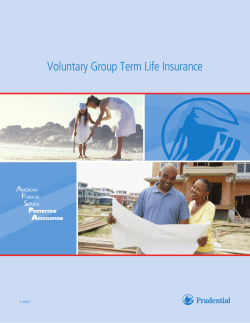
7 October 2014 companies
7 October 2014 To: All directors of authorised deposit-taking institutions, general insurers and life companies Improving APRA’s board engagement APRA’s approach to supervision is built on the premise that the board and management of an APRA-regulated entity each play a distinct but key role in the financial soundness and prudent risk management of the entity. The requirements placed on boards of APRAregulated entities form part of APRA’s broader prudential framework, designed to protect the interests of depositors and policyholders and to support a stable, efficient and competitive financial system. Over recent years, APRA has received feedback that some areas of the prudential framework are perceived to require board involvement in matters that are more appropriately reserved for management. That is not APRA’s intent. As a result, APRA has undertaken a stocktake of its requirements of boards and is seeking to improve how these requirements are conveyed. Aid for Directors of ADIs and insurers To assist directors’ understanding of the additional responsibilities and duties that come with being part of the board of an APRA-regulated entity, APRA is releasing with this letter an Aid for Directors of authorised deposit-taking institutions (ADIs), general insurers and life companies. The Aid for Directors provides an overview, in general terms, of the purpose of prudential regulation, the legal framework through which it is implemented, and the additional obligations applying to directors of APRA-regulated entities. APRA is sending the Aid to all existing directors of ADIs and insurers. The Aid will also be made available on APRA’s website. Review of board requirements Following its stocktake, APRA intends to review the clarity of its requirements of boards in the prudential standards (and supporting guidance materials). In undertaking this review, APRA intends to avoid any compromise of the standards expected of regulated institutions. However, APRA will seek to ensure that its requirements of boards are communicated in a way that properly recognises the respective roles of the board and management. Where the clarity of APRA’s expectations in this regard can be improved, APRA will make amendments to the existing suite of prudential standards as opportunities permit. In the meantime, APRA will continue to apply a principles-based approach in its day-to-day supervision of APRA-regulated institutions. It is proposed that this review be undertaken initially for ADIs, general insurers and life companies. It is not proposed that superannuation fall within the scope of this review, 2 given the superannuation prudential standards have only recently been released. The need for review of the superannuation standards will be considered at a later stage. APRA welcomes feedback on any material concerns regarding specific board requirements or expectations contained within APRA’s prudential standards and guidance materials. This feedback will assist APRA in prioritising the areas for review. Comments should be provided by 30 boardexpectations@apra.gov.au and addressed to: Mr Pat Brennan General Manager, Policy Development Policy, Statistics and International Australian Prudential Regulation Authority GPO BOX 9836 Sydney NSW 2001 Yours sincerely, Wayne Byres Chairman November 2014 by email to 3 Important disclosure notice – publication of submissions All information in submissions will be made available to the public on the APRA website unless a respondent expressly requests that all or part of the submission is to remain in confidence. Automatically generated confidentiality statements in emails do not suffice for this purpose. Respondents who would like part of their submission to remain in confidence should provide this information marked as confidential in a separate attachment. Submissions may be the subject of a request for access made under the Freedom of Information Act1982 (FOIA). APRA will determine such requests, if any, in accordance with the provisions of the FOIA. Information in the submission about any APRA-regulated entity that is not in the public domain and that is identified as confidential will be protected by section 56 of the Australian Prudential Regulation Authority Act 1998 and will therefore be exempt from production under the FOIA.
© Copyright 2025



















